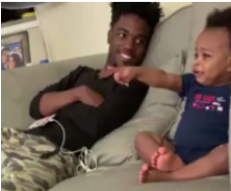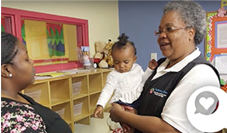Head Start ECLKC: Social Stories
Head Start ECLKC: Social Stories
Children who have difficulties with social interactions often have trouble interpreting social situations and responding appropriately. The Head Start Early Childhood Learning & Knowledge Center (ECLKC) Social Stories™, developed by Carol Gray, help children understand the events and expectations in their lives.
The Head Start Center for Inclusion (HSCI) offers a library of one-page Social Stories™ that can be downloaded, printed out, and customized for immediate use. Teachers and parents may also use these as a template to write their own stories that meet a child’s individual needs.
Center on the Developing Child, Harvard University | Social-Emotional Behavior
Early childhood is a time of both great promise and considerable risk. Assuring the availability of responsive relationships, growth promoting experiences, and healthy environments for all young children helps build sturdy brain architecture and the foundations of resilience.
- Let’s Tell the World About #ServeAndReturn! Jul 2019
 Did you see the video of the father and his baby on social media talking to one another? It was not only entertaining, but also a great example of “serve and return.” The Center for the Developing Child is taking full advantage of this video and has included the video in it’s framework for explaining ‘serve and return’.
Did you see the video of the father and his baby on social media talking to one another? It was not only entertaining, but also a great example of “serve and return.” The Center for the Developing Child is taking full advantage of this video and has included the video in it’s framework for explaining ‘serve and return’.
- Having a conversation with Dad (Video) Jun 2019 | Length: 1:25 mins
- What is Early Childhood Development? A Guide to the Science Mar 2019
This guide leads you through video and research resources that bring to life the importance and scientific rationale for investing in early childhood as well as providing strategies for service providers, teachers and families. - Training Module: Talk with Me Baby
 Learn how to empower and support families so that they can engage in meaningful conversations with their young children and advance their language and lifelong learning. The eight-session “Talk With Me Baby” course, which includes multimedia content from the Center on the Developing Child, is open to the public and available through Cox Campus and Read Right from the Start, a program of the Rollins Center for Language & Literacy.
Learn how to empower and support families so that they can engage in meaningful conversations with their young children and advance their language and lifelong learning. The eight-session “Talk With Me Baby” course, which includes multimedia content from the Center on the Developing Child, is open to the public and available through Cox Campus and Read Right from the Start, a program of the Rollins Center for Language & Literacy. - 5 Steps for Brain-Building Serve and Return
Child-adult relationships that are responsive and attentive—with lots of back and forth interactions—build a strong foundation in a child’s brain for all future learning and development. This is called “serve and return,” and it takes two to play! Follow these 5 steps to practice serve and return with your child.
-
Additional Resources from Center on the Developing Child
- 8 Things to Remember About Child Development
- The Spectrum of Neglect: Four Types of Unresponsive Care
Using science as a guide, this interactive chart delineates four types of diminished responsiveness and their consequences in order to provide a useful framework for developing more effective strategies to protect vulnerable children from this complex challenge. The four short video clips below, each under a minute in length, are excerpts from the 6-minute video InBrief: The Science of Neglect. The chart is based on a graphic from The Science of Neglect: The Persistent Absence of Responsive Care Disrupts the Developing Brain, a Working Paper from the National Scientific Council on the Developing Child.- Enhancing and Practicing Executive Function Skills with Children from Infancy to Adolescence
Executive function and self-regulation (EF/SR) skills provide critical supports for learning and development, and while we aren’t born with these skills, we are born with the potential to develop them through interactions and practice. A new 16-page guide describes a variety of activities and games that represent age-appropriate ways for adults to support and strengthen various components of EF/SR in children. Each chapter of this guide contains activities suitable for a different age group, from infants to teenagers. The guide may be read in its entirety (which includes the introduction and references) or in discrete sections geared to specific age groups. - Downloadable resources including 8 Working Papers
- Tipping the Scales: The Resilience Game Have fun while testing your knowledge of the most effective ways that communities can build resilience in children.
- Building Core Capabilities for Life (PDF)
This report combines research from the biological and behavioral sciences with practical, on-the-ground knowledge from working with adults and families to provide effective solutions for helping individuals develop more effective skills for coping with adversity.
- Enhancing and Practicing Executive Function Skills with Children from Infancy to Adolescence
How People’s Misconceptions Of Disability Lead To Toxic Microaggressions
Feb 2019
In general, society and the media have two extremely polarizing views on people with disabilities. They are viewed as either remarkable and heroic or victims and pitiful. Since disability falls on a wide range of a spectrum, these stereotypes are very limiting and can lead to severe repercussions for the disabled community and their views of themselves. For the outside, able-bodied population, these biases cause them to set forth unconscious microaggression toward their peers with disabilities.
3 Myths of “Special Education”-Thoughts for Parents
Published: 2018 | Catia Malaquias, StartingWithJulius.org.au
When decades of evidence have shown that segregated education disadvantages students with disability by producing inferior academic and social outcomes in a “low expectations” environment, then it is fair to say that the ‘choice’ of parents to segregate their children in a very real sense can be “disabling” in itself. The failure of Governments and professionals to better guide parents in their decision-making is unconscionable – even negligent.
Social Stories for Autistic Children
Children with autism spectrum disorder (ASD) can sometimes have difficulty when it comes to mastering social skills, as well as communication skills. The good news is there are various strategies or tools developed by experts to help people caring for children with ASD so they grow and succeed. Among these tools are the social stories specifically created for these kids.
15 Behavior Strategies for Children on the Autism Spectrum
July 2016
In this article you will find 15 supportive behavior strategies for children on the autism spectrum (some strategies can be used with adults as well). Many of the strategies can also be used to help children without autism who have challenging behaviors.
Disability and Sexuality (Video)
Published: Mar 2019 | Length: 2:53 mins
All people are sexual beings, no matter what their bodies can or cannot do physically or what type of support they may need from time to time or all of the time. It’s important for young people living with disabilities or differently abled young people to learn about sexuality.
Attitude: From New Zealand-Documentaries of People Living with Chronic Health Conditions (Videos)
Documentaries and videos of people living with chronic health or disability.
- Iziyah’s World: Oscar Published: Dec 2018 | Length: 4:51 mins
Forget about your Jimmy Fallons and your James Cordons – the hottest new talk show host is 6-year-old, Iziyah Moemai. Living with chronic granulomatous is hard enough for many people to say but Iziyah just takes it in his stride. Here he teaches Oskar Kightley what life’s all about. - Kids with Disabilities: Iziyah Published: July 2017 | Length: 2:31 mins
“Sometimes I’m the same and sometimes I’m a bit different!” Iziyah deals with some unique medical issues that most six year olds aren’t familiar with. In this video he introduces us to his world and his big dream. - Kids with Disabilities: Harper Published: Nov 2017 | Length: 2:40 mins
Harper is six years old and full of life! Despite some health challenges, he gives everything a go and wants to be a famous actor when he grows up.
When Immigration Status Impacts Young Children (Videos)
Published: Sept 2018 | Length: Most under 1 min
Lori provides an overview of the legal and practical reasons why schools should not ask families or students about immigration status. See related resources here: ow.ly/6mZa30kauwz
Special Olympics 50 Game Changers (Videos)
ESPN and Special Olympics have teamed up on a year-long storytelling initiative telling the stories of game changers and game changing moments toward inclusion. Check back each week for a new story of inclusion. Below is a sample of the game changing inclusion stories:
- Unified Sports (Video) Length: 5:26 mins
Unified Sports was inspired by a simple principle: training together and playing together is a quick path to friendship and understanding for athletes with and without intellectual disabilities.“It’s not he or she. It’s us and we.” Jake Van Mierlo, Unified Partner. On this week’s @SpecialOlympics 50 Game Changers, see how Unified Sports is changing the experience for athletes all over the world! #InclusionRevolution
- Bree Bogucki (Video) Length: 5:16 mins
For Bree Bogucki, growing up was anything but easy. Her disabilities prevented her from living the life she knew she could have. She grew up isolated, locking herself in her room. At nine-years-old, Bree was introduced to sports and her life was changed forever.Bree quickly began to excel, landing her not only an athletic scholarship but an academic one as well at Tennessee Wesleyan. It was there where Bree began to thrive as an athlete, student, but also an advocate for those with disabilities.
- Rosas’s Law (Video) Length: 5:19 mins
“Some say we shouldn’t worry about the words, just the way we treat people. But if you think about it, what you call people is how you treat people. If we change the words, maybe it’ll be the start of a new attitude towards people with intellectual disabilities. And they deserve it.”In 2010, President Barack Obama signed “Rosa’s Law” which changed “mental retardation” to “intellectual disability” in US federal law. Inspired by nine year-old Rosa Marcellino, the law was a key component in the groundswell of advocacy efforts promoting inclusive, people first language for people with intellectual disabilities.
One such effort to end the hurtful use of the “R-word” is the “Spread the Word to End the Word” campaign, launched in 2009, inspiring over 1,000,000 people to sign the pledge to end the R-word. Ten years later, Spread the Word to End the Word is becoming Spread the Word: Inclusion, focusing beyond one word and creating a new reality of inclusion for all people with intellectual and developmental disabilities.